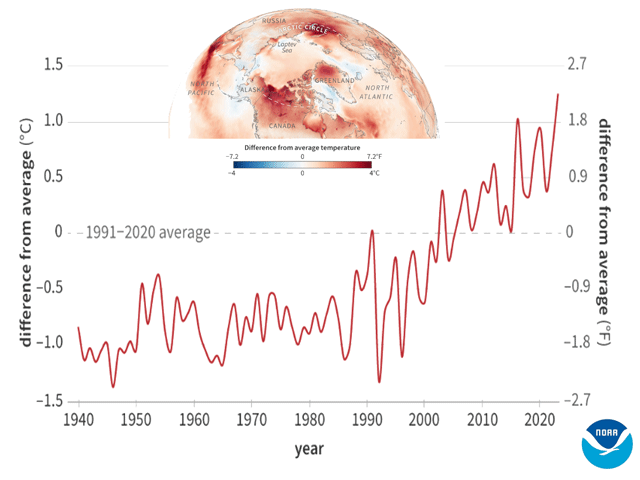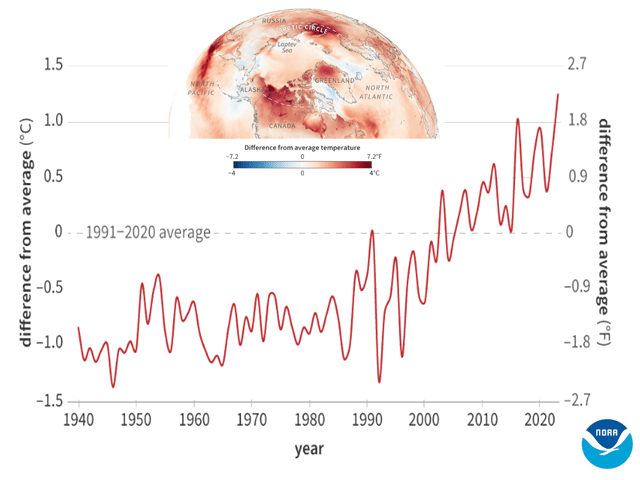Ag Weather Forum
Arctic Logs Hottest Summer on Record in 2023
The annual Arctic Report Card is in, and it shows that the air, ocean and land in Earth's far north continue to warm at a faster rate than anywhere else. That rapid warming has significant effects on "people, ecosystems and communities," in the words of the report overview by Rebecca Lindsey and Michon Scott. The Arctic Report Card is now in its 18th year and is the work of 82 authors from 13 countries. The overview is posted on NOAA's www.climate.gov/ website.
The report card notes, "The past year, October 2022-September 2023, was the sixth-warmest year in the Arctic since records began in 1900. It was the 14th consecutive year in which Arctic temperatures exceeded the 1991-2020 average, according to the Arctic Report Card: Update for 2023 (https://arctic.noaa.gov/…). (The Arctic monitoring year runs from October of one year to September of the next to span the region's cold season.)"
The summer season, defined as July through September, featured intense warmth in western North America, northern Greenland and western Russia. The report card noted locations with temperatures running lower than average were limited. No location was significantly cooler than average.
P[L1] D[0x0] M[300x250] OOP[F] ADUNIT[] T[]
The result was a record warm summer in the Arctic Region. Data compiled by the Copernicus Climate Change group, a climate analysis service managed by the European Union, show that July-September 2023 had temperatures spiking to as much as 7.2 degrees Fahrenheit above the 1991-2020 average.
"It's been nearly 20 years since the Arctic experienced a cooler-than-average summer," the report overview noted. It also highlighted how the unusual warmth of northern Canada combined with below-normal precipitation to enhance the region's extreme wildfire season and resulting smoke in the United States. In Greenland, unusual warmth in summer 2023 contributed to a cumulative melt-day area that approached the record on the Greenland Ice Sheet.
Another key detail in the 2023 Arctic Report Card is the ongoing enhanced warming in the far north. In fact, since 2000, Arctic temperatures have risen at least twice as fast as global temperatures and possibly even faster, according to the Arctic Report Card overview. The term "Arctic amplification" is used to identify what the overview describes as "a widely recognized phenomenon in which human-caused global warming is amplified at the poles, causing the Arctic to warm more quickly than the rest of the globe. Multiple factors enhance warming at high latitudes, but the main one is that warming reduces snow and ice, which would otherwise reflect incoming sunlight." Authors of the Arctic Report Card emphasized that the region's eight warmest years on record have all occurred since 2016.
Another highlight of the 2023 report, in addition to detail on declining sea ice and how ocean warming is leading to a continuous warming loop, is a discussion on the greening of the tundra in the far north, with grass and shrub growth overtaking lichens and mosses. More grass may benefit grazing caribou and reindeer; however, the increase in water demand by grasses, shrubs and sedges could also dry out soils and increase fire risk, along with hindering the reflection of sunlight by snow cover, which enhances warming in the region.
The complete Arctic Report Card is extensive with detailed graphics to help communicate the report card findings. The full Arctic Report Card is available here: https://www.climate.gov/….
Bryce Anderson can be reached at Bryce.Anderson@dtn.com
(c) Copyright 2023 DTN, LLC. All rights reserved.





Comments
To comment, please Log In or Join our Community .